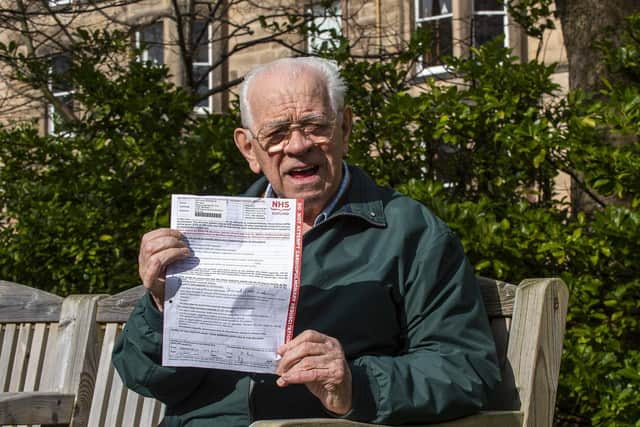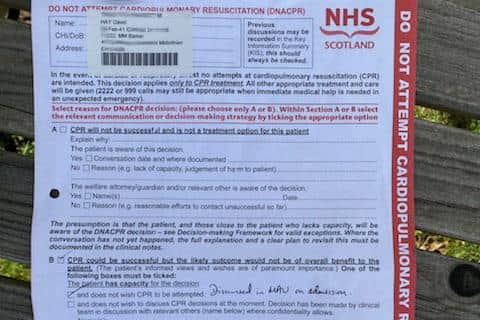'Take this gun away from my head' says 80-year-old handed 'do not resuscitate' letter
and live on Freeview channel 276
David Hay, from Edinburgh, was devastated when he was handed the letter while being discharged from the city’s Western General Hospital.
Mr Hay, who had been admitted to the ICU following a seizure, was shocked to get the notice informing him that he would be denied life-saving treatment.
Advertisement
Hide AdAdvertisement
Hide AdNow he’s ‘worried sick’ about what the future holds for his wife Janet, who has dementia.


It comes as a recent BBC investigation revealed hundreds of DNARs had been issued in the past year with no agreement from with the person or their family, sparking calls for an overhaul of care planning decisions.
Becoming distressed as he recalls the day he got the letter, Mr Hay said: “I was shocked. They gave me it while I was waiting for the ambulance to take me home. I didn’t sign it. It’s telling me that’s it, I’m finished. I am so angry. It’s like we are being targeted, my generation. What happens if I take ill. Who would be here for my wife? She has dementia. I’m worried sick about it. But what can I do.”
The granddad of five worked as a baker and in the civil service and has been married to Janet for 35 years. He has frequent falls so has to be accompanied by family when he leaves home.
Advertisement
Hide AdAdvertisement
Hide AdHe added: "I do feel hurt at this. I have got asthma but it’s kept under control with my inhalers. I’ve worked hard all my life. I want this stopped, take this gun away from my head! I want to live. My wife has good and bad days and she’s independent but I want to be there for her. I’ve got a granddaughter studying medicine. I want to live to see her become a doctor.”


Charity Age Scotland has called for an investigation into the use of DNARs issued without patient consent, saying older patients feel “cast aside without a fighting chance”, describing Mr Hay’s case as “extremely distressing, but sadly far from unique”.
A BBC investigation last week revealed people’s human rights could have been breached in over 500 cases south of the border where "do not resuscitate" decisions were made during the Covid pandemic. Responding to the findings NHS branded blanket DNA(CPR) decisions as “unacceptable.”
The policy is intended to prevent inappropriate or unwanted attempts at CPR which could cause significant distress to patients and families.
Advertisement
Hide AdAdvertisement
Hide AdBut under national guidance clinicians are expected to discuss decisions with patients in a compassionate manner and clearly state the reasons behind the decision. Letters were issued jointly by the Scottish Government, Royal College of General Practitioners Scotland and BMA Scotland at the start of the pandemic to stress this.
Mr Hay added: “The GP had told me about a DNR over the phone but I challenged it. I didn’t agree to sign anything and neither did my family. But the DNR letter was signed by a GP from my surgery. They made up their mind, they have blinkers on.”
Brian Sloan, Age Scotland’s Chief Executive said: "This case sounds extremely distressing, but sadly far from unique. Our helpline has heard from a number of older people and their families across Scotland who are very concerned and angry about the way DNACPR (Do not attempt cardiopulmonary resuscitation) decisions were applied to them in the past year.
“Older people have told us they have received calls from their GP asking them to agree not to receive medical intervention if their heart or breathing stopped. Others have discovered the completed form in their hospital discharge notes, with no knowledge of having agreed to it. This has caused a great deal of alarm and upset, and left some feeling their lives were less valued because of their age.
Advertisement
Hide AdAdvertisement
Hide Ad“We have written to Healthcare Improvement Scotland calling for an investigation into the use of DNACPRs during the Covid pandemic. There are a number of questions about whether people’s human rights were breached when these decisions were made without discussion or knowledge.
"It’s completely unacceptable that some older people’s wishes were not respected, giving them the impression they were being cast aside without a fighting chance.”
A Scottish Government spokesperson said: “No one should ever feel pressured in any way whatsoever when discussing treatment options – and the Covid-19 pandemic has brought about absolutely no change to the use of Do Not Attempt CPR forms in NHS Scotland, and no change to the advice issued to clinicians about their use. Decisions relating to whether an individual would benefit from Cardiopulmonary Resuscitation (CPR) are matters for the individual and the healthcare team responsible for their care.”
A message from the Editor:
Thank you for reading this article. We're more reliant on your support than ever as the shift in consumer habits brought about by coronavirus impacts our advertisers.
If you haven't already, please consider supporting our trusted, fact-checked journalism by taking out a digital subscription.
Comment Guidelines
National World encourages reader discussion on our stories. User feedback, insights and back-and-forth exchanges add a rich layer of context to reporting. Please review our Community Guidelines before commenting.